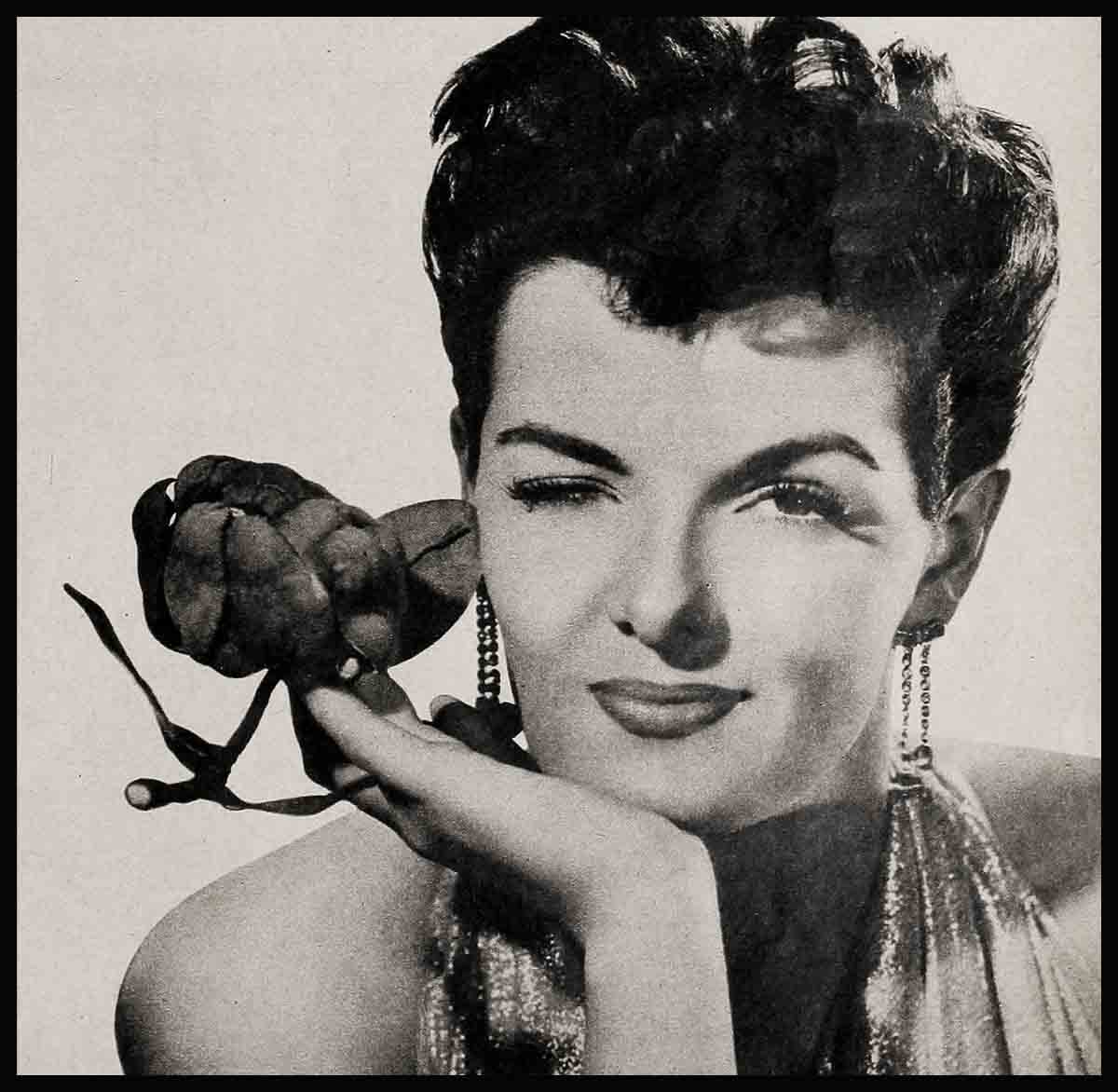
They’re All Crazy!—Jane Russell
A first-time visitor to Ma Russell’s acreage out in the San Fernando Valley must come away completely exhausted and more than a little bug-eyed. He couldn’t possibly take it all in during a single visit. “It’s a rabbit hutch,” muttered one unnerved individual as he crept away.
The family of Jane Russell tells this on itself with huge delight. They couldn’t care less if they really lived in a rabbit hutch and, besides, they thought it was a pretty fair description. Undulating in and about two small houses and the chapel which is the heart of their existence are Mother Russell, ninety-year-old Great-aunt Jane, the four Russell boys, their wives, ten small children and assorted dogs. Except for Great-aunt Jane, who entertains herself by reading the obituaries of people far younger, they are all terribly active. When she isn’t making a picture, daughter Jane and her two young ones add to the energetic population as much as possible—and, of course, there are always other people drifting about the premises for spiritual solace, for a handout, or simply because they’ve fallen under the spell of the oddball Russells.
“They’re the most wonderful people in the world,” commented a friend who could, by temperament, easily be blood kin to them. She added without any change of expression, “I went up to see Mother Russell right after I got out of the insane asylum, and the first person I saw was Jamie, out in the yard. He hollered, ‘Hey, here comes the crazy girl!’ and that was that.
“You don’t see anything particularly wonderful about it? That’s the Russell approach to everything: bring it out into the open. Secret things are bad things, secret wounds fester, so they don’t have any. When I got out of the insane asylum, everybody but the Russells avoided the subject like the plague. So, for a long time, they were the only people I felt comfortable with.”
As it happens, the girl had merely suffered a nervous breakdown—but if she had gone completely off her rocker, she’d be right at home with the Russell family. They’re all crazy, too. It’s a pleasurable state of mind which they enjoy except for the inconvenience that Jane’s career has caused them. “I’m a character,”’ admits Kenny, her second’ brother, without a trace of self-consciousness. “I’ve been one all my life, and nobody noticed a thing until Daughter became a movie star. After that, I had to watch myself. When I was being perfectly natural, people accused me of showing off because I was Jane Russell’s brother. It was enough to inhibit anybody—except me, I guess.”
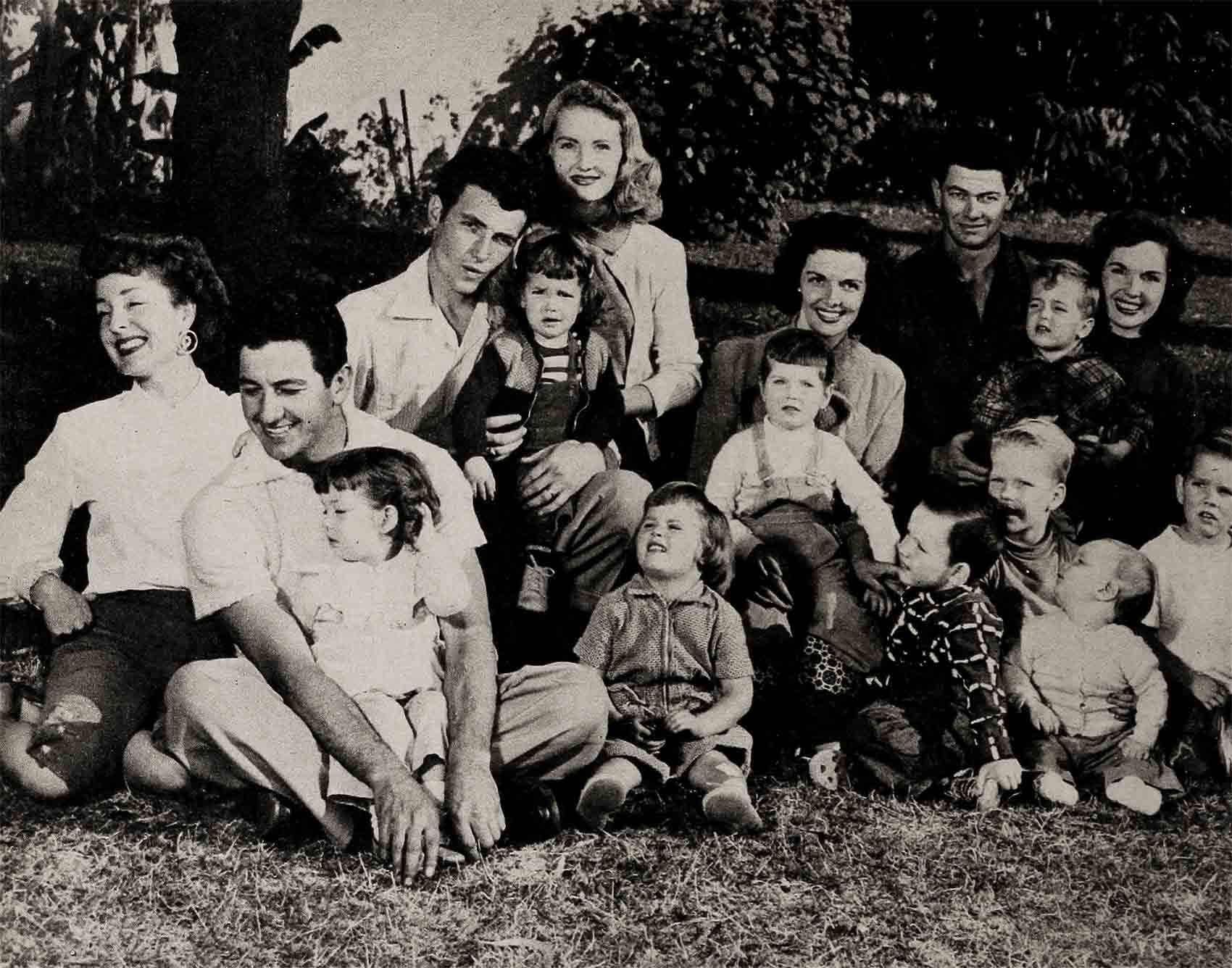
The Russells now live—or, at least, poise momentarily—in the citrus grove of what was originally the family estate. Standing at Ma’s or Jamie’s front door, they can look over at the huge hacienda that was the home of their childhood, sold after the death of Father Russell because there was no money left to maintain it. The house and five acres of land went, the Palomino saddle horses, the children’s ponies and most of the stock. Being Russells, the family neither avoids looking at the big house nor cares a whit that it no longer belongs to them. Being Russells, they’re too busy living it up in the present to brood about the past.
Although Jane controlled her brothers by systematically belting the daylights out of them, Ken was the least intimidated, the fastest with the kind of sass that infuriated her. “Being such a bright boy,” she says sourly, “he was also a smart aleck.”
It had to be Ken who “borrowed” Jane’s ears for wild, midnight rides. As soon as everyone in the house was safely asleep, Ken and little brother Wally would push the car as far as the gate, where its engine couldn’t be heard, and light out for Riverside to see Kenny’s girl.
“I remember the last time real well,” Wally says. “It was while Jane was making The Outlaw, and she had just bought herself this new Pontiac convertible. Kenny was going into the Navy the next day, so naturally he had to see Lois that night. The only way to do it was to take Jane’s car. Boy, it was raining buckets that night, but we put the top of the convertible down anyhow and set out to see how fast a Pontiac would travel—pretty darned fast.”
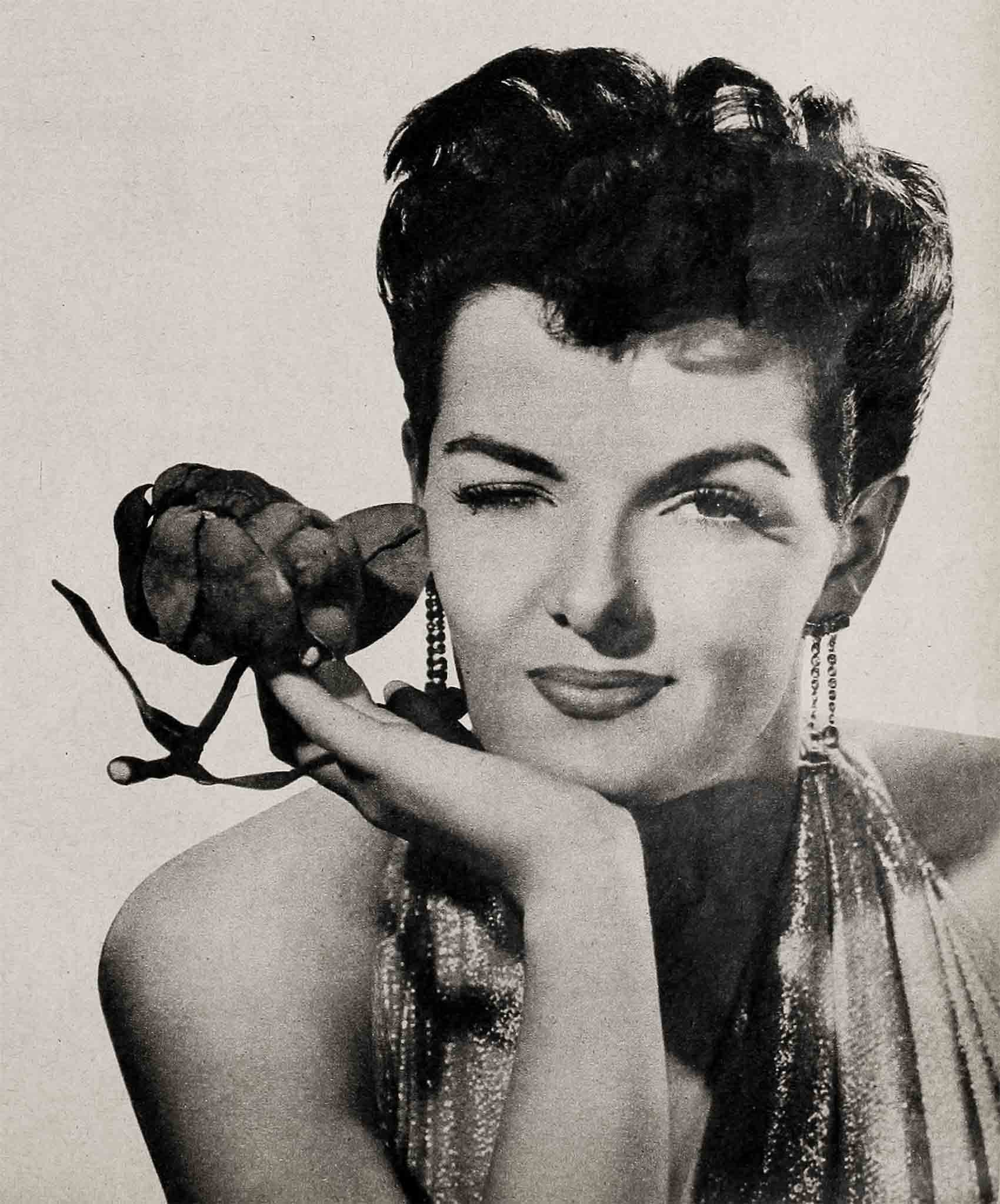
The next morning Jane took one look at her bedraggled, mud-spattered gem and blew her ebony top. “Whohad my car out last night?” she demanded in clarion outrage.
“Kenny,” answered Wally, concentrating on his breakfast.
Daughter started looking for a club. “Where is he?”
“Probably on his way to San Diego by now. He spent the night with Lois’ folks in Riverside.”
“Then who drove my car home?”
“I did,” Wally replied with his usual aplomb. He was all of twelve years old.
If you suggested to the four beautiful girls who married the Russell boys that Ken was the family character, you’d meet with a chorus of protests; they insist that he’s just a normal, healthy boy. It’s Jamie who’s a character.
Jamie adores his wife Pam. So much so that he insists upon her staying in bed mornings while he fixes the baby’s bottle and gets breakfast.
“Of course,” Pam says thoughtfully, “I’d have to be as deaf as a post to get any more sleep. Jamie is slamming things around in the kitchen and roaring at the top of his lungs about no-good women who lie abed, letting their husbands and children go hungry.”
“Dramatic to his fingertips,” is Jane’s evaluation of Jamie, who had a small role in her currently successful Gentlemen Prefer Blondes. “He never stops acting.” His favorite portrayal is a death scene and, as he is certain to have his biggest audience then, his favorite time for emoting is during a meal. The larger the gathering, the better are the chances that Jamie will suddenly fall to the floor at their feet. He has been poisoned—or he is strangling. He clutches his throat, gasps, writhes, groans and finally expires, while the family ignores him entirely or Mother Russell acknowledges his performance by saying, “Get up off the floor, Jamie, and eat your food.”
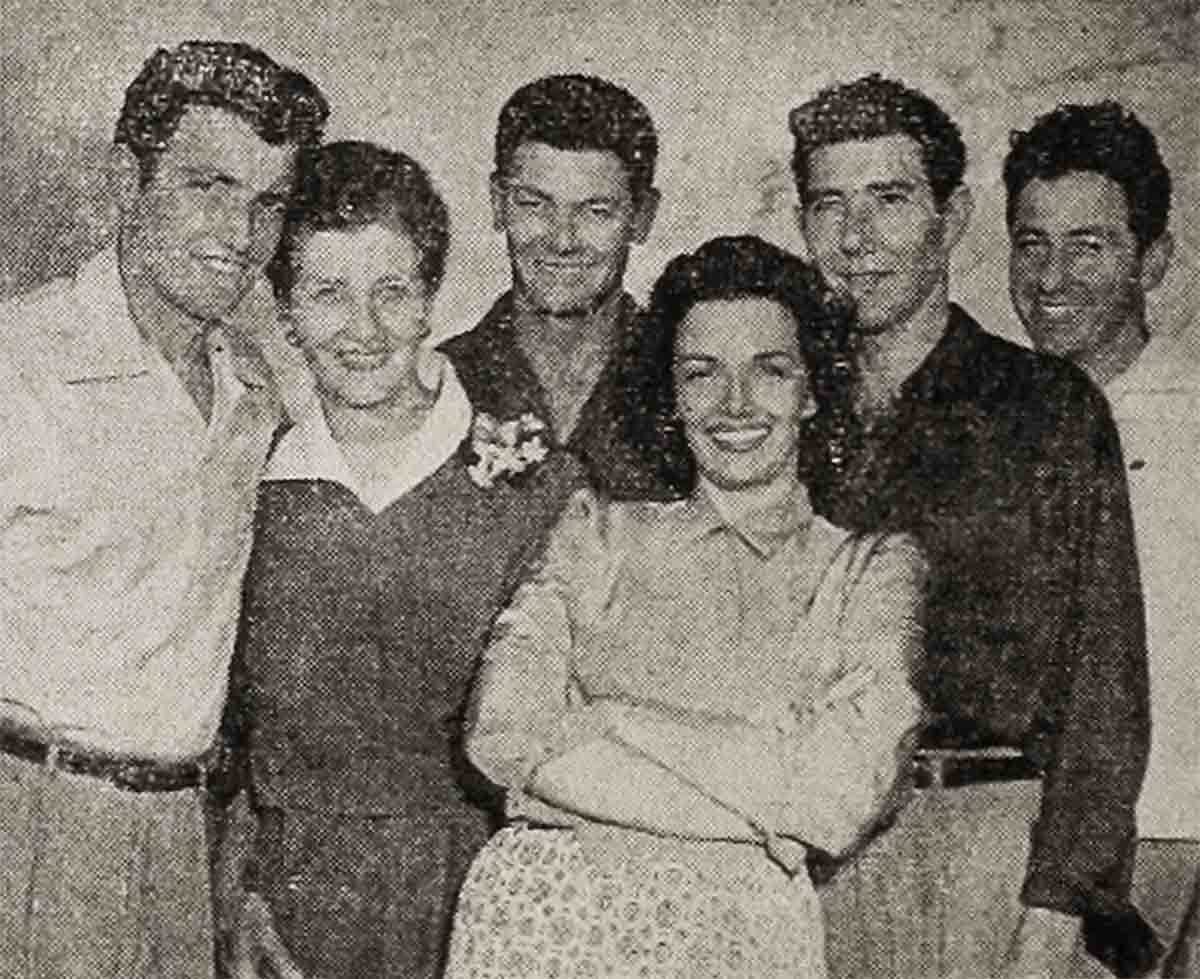
It should Not be inferred that the rest of the family ignores Jamie because they disapprove. They’re just hungry. If he chooses some other moment to entertain them, they all watch with lively interest—because what the Russells enjoy most is each other. Working and playing together is their idea of heaven. Tom, Kenneth and Wally, complete with families, took off on a construction job a couple of years ago, and while it lasted they had a ball because they were together. Then they pooled their resources to buy an alfalfa ranch; they didn’t expect to make a fortune growing alfalfa, but a ranch was something they could work together. It turned out to be a bad investment—the alkali in the soil being strong enough to burn up their crop within two years and something burning down Kenny’s ranchhouse to the foundations the very first year—but it was worth a try. Now they are home again. Tom and Kenny have joined Jamie at the corner gas station, and Wally is self-employed as a landscape artist. Maybe they haven’t made a lot of material progress, but they’re happy as clams. After all, they’re all together.
Jane, The Old One, remains as much a part of her crazy family as if she didn’t have twenty-four other activities for the hours of the day. Sometimes the boys or their wives read the stories written about her moodiness or her temperament, and they raise their eyebrows at each other. She always was sort of horsy about some things, like kid brothers staying out of her room, and they’re glad to know that she hasn’t changed. But they also know something that the writers don’t: that behind the fierce noises Jane makes is an enormous sense of responsibility.
“Once, when Jane was still a small girl,” Ma Russell remembers, “her teacher came to see me. She asked me so many questions about what kind of child Jane was and what she did at home, that I really had to stop and think. Finally, I said, ‘Well, mostly, she helps me with her brothers.’ ”
It explained quite a bit to the baffled teacher, who had been unable to persuade little Jane to do Her own lessons. Not that she was a problem child—but every time the teacher looked up, it was to see Jane at one of the other work tables, explaining to a more backward classmate, “No, no, honey. Do it this way.”
At times that sense of responsibility manifested itself in inspiration, at other times it ended up as ludicrous, but it was always protective, as Kenny can testify.
He was fifteen or so when tragedy smote him. The ever-loving eye of his Lois was caught by another handsome lad, Ken took exception to the competition, and a fierce quarrel ensued. The usually ebullient Kenny was crushed; he moped around the house like a kicked puppy until his condition came to Jane’s attention.
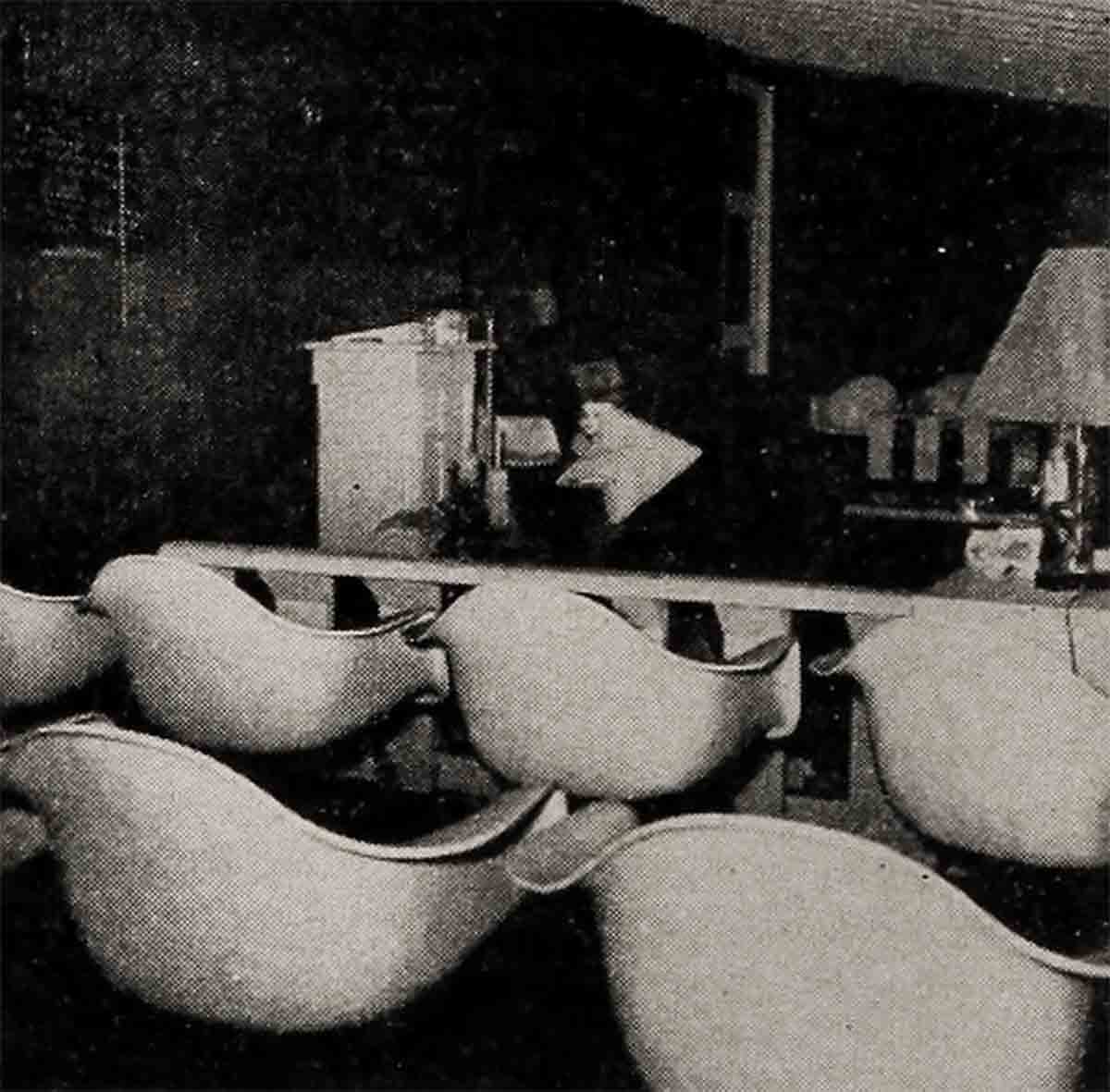
She heard his lovelorn story, then commanded, “Sit down. I’m going to dictate a letter, and I want you to mail it to Lois.”
“It was a horrible letter,” Ken says with a grin. “Imagine me asking Lois who she thought she was, telling her to get down off her pedestal, saying that breaking up with her wasn’t hurting me a bit. The day I mailed that, I knew for sure that Lois would never speak to me again!” Jane knew better, and she was right—Lois had no more than read the letter than she was on a bus for Los Angeles, smitten all over again with her high-handed Lothario.
Time passed, and sailor Kenny came home on leave from the Orient. He and Lois agreed that fighting with each other was more fun than doing anything else with a couple of other people, so they decided to be married at once. Arrangements for the wedding were duly made. “But Daughter thought of one detail that everyone else overlooked,” chortles Ken. “The night before I got married, she sat me down and told me the facts of life—without mincing any words, either! I can tell you, I was shocked. I don’t know how she thought I could have been in the Navy for two years without finding out about things like that, but she had to be sure. She didn’t think we’d have a very good foundation for marriage if I still believed in the birds and bees!”
Jane’s feeling for her little brothers hasn’t changed an iota, but her position in Hollywood has somewhat altered their acceptance. Though Jamie has a degree in cinematography and is deeply interested both in acting and directing, he refuses a professional boost from her. “If I can’t make it without Daughter’s help, I’ll keep on filling gas tanks. People never believe you have any real talent if you get a break through your relatives.” Similarly, Wally, whose fine singing voice seems destined to land him in musicals, would rather stick to spirituals in the chapel than accept a helping hand. Stubborn guys, the Russells.
The Old One is mildly grieved and largely exasperated by their attitude. “None of them will tell me when they need something. I have to make Ma tell me—and then go home and try to talk my old man out of it!”
They love Jane good, but they haven’t always loved her career; it got them too many knots on the head. Imagine what it must have been like to be Jane Russell’s brother at the time that she was exploited as the sexpot of the century in The Outlaw. It got to be a pretty bruising experience, especially since all four boys were in service at the time and servicemen are notably indelicate on the subject of sexpots.
“I always tried to keep quiet about her being my sister,” said Wally, who was with a Navy jet squadron, “but you can only keep your mouth shut so long.” His thin, dark face, closely resembling that of his sister, reflected distaste at a remembered experience.
His outfit was at chow one day when one of their number came back from a leave in Los Angeles. Naturally, the other guys asked him about his adventures and he told them what he had done: he had met the most talked-about girl in America, Jane Russell.
“Is that a fact, now?” asked a quiet crew member by the name of Russell.
It was a fact, said the guy, lying in his teeth. They had gone dancing at Ciro’s and, what’s more, Jane Russell picked up the tab for the evening’s entertainment.
“Say,” interpolated Wally, “I like to dance. Maybe you’ll introduce us sometime when we’re down there?”
Everything would have been ginger-peachy if it had stopped right there but of course it couldn’t. At the urging of his fellow crewmen, the imaginative gent began to tell them how he made love to Jane Russell—and Jane’s little brother lost his temper. How could you ever explain to a bunch of G.I.’s that any resemblance between Jane and the publicity on her picture was strictly hogwash? You couldn’t, so you took your lumps and hoped you raised a few on the other guy.
It happened to all four of her brothers time and again, and they never figured a way out of the quandary. Establishing their identity right off was a mistake, they found. To some of the men it smacked of boasting, to most it placed that particular Russell in the freak category.
“I remember being on a new ship once,” contributed Jamie, “and word got around that Jane Russell’s brother was standing watch at Station Two. I’ll bet every man aboard sauntered up to look at me before my watch was over. What an uncomfortable four hours that was!”
If being identified as Jane’s brother was bad, hearing crude comments on her physical attributes and bawdy speculation on her virtue was intolerable. The Russell boys were engaged in two wars during those years—for Democracy and for Daughter.
Jane knows what they went through, since her family is anything but secretive, and it is a contributing factor to her sensitivity about publicity. After thirteen years, though, the public has accepted the fact that Jane Russell is a decent girl, albeit a slightly salty, strikingly beautiful and undeniably voluptuous one. And her family is pretty well adjusted to the fact that portraying sultry sirens on the screen is merely what she does for a living. It hasn’t changed her a bit.
They present a solid front to the world, the Russells; they are for one another, and no mistake about it. In the bosom of the family, however, they admit to some When one is in the wrong, the others unhesitatingly say, ‘Now, look, thus-and-so is wrong. Let’s sit down and talk it over and straighten things out.’ And they talk it out, whether the problem is that one of their wives has left in a momentary snit or something less intimate.
Jane’s career does not make her an exception to this family rule. While The Big Rainbow was in production, too many things happened at once. She was upset by the unfortunate publicity about The French Line. Her contract with Howard Hughes expired, and she was faced with a big decision. Torn between her loyalty to the man who had made her a star and her desire for more freedom, she had to make up her mind about signing a new contract. There were the numerous charities on behalf of which she had personal appearances to make. The picture called for strenuous effort on her part at a time when she was physically exhausted. There were tensions of so personal a nature that she discussed them with no one. And, estimated Edith Lynch of the RKO publicity department, about forty calls a day from friends who needed help of one kind or another. Understandably, Jane cracked up, and the studio sent her off to the desert for a badly needed rest.
The day she returned to town, Ma Russell called. “The boys want you to have dinner with them tonight in the Eagle’s Nest,” she said.
Jane was pleased; she hungers for her family after a few days’ absence. But when she got to the Eagle’s Nest, which is a new addition to the chapel, she found that this was a different kind of family gathering indeed. Ma Russell had cooked dinner and departed. The four wives were not present; the ten kids and the dogs were also conspicuous by their absence.
“I didn’t know whether to laugh or cry,” said Jane. “My brothers were all so serious that I expected a gag any minute—but they weren’t kidding.”
They weren’t. They reminded her that she had collapsed while making her last three pictures and delivered themselves of an ultimatum: either her husband or her agent had to do something about her treadmill or the Russell boys were going to step in. They didn’t know exactly what they could do, but there were four of them and they ought to think of something. They had to; otherwise her health might be permanently injured.
“What they didn’t know was that I was getting the same thing from Robert every day when I got home from the studio. He was giving me what-for up one side and down the other; hammering at me because I was doing too much.”
Jane shrugged. “What can I give up? Making pictures? Personal appearances? Charity work? The chapel? My home and children? My friends? There’s nothing I can stop doing—but Robert promised to find me a secretary, and that will take part of the load off. Personal problems, given time and the Lord’s help, solve themselves. There was nothing the boys could do—I felt fine again—but it meant a lot, talking it out with them, knowing they were behind me like always.”
In Hollywood there is considerable double-talk about the conflict between Jane’s husband, Robert Waterfield, and her family. She can’t be happy, they say, torn between the two camps. Jane bit off a short, choice expletive at the suggestion. “There isn’t any conflict, because Robert is so much like my father. They both came from small families and they just didn’t have our feeling for large ones.
“My father was an executive. When he came home at night, he was tired and had things on his mind. He couldn’t relax with the boys boiling all over the house so I kept them away from him in a separate wing. Robert is the same way. It isn’t that he dislikes my family; he just doesn’t like any large, noisy gathering of people. He always goes to family reunions with me—and a real one runs into hundreds of relatives, all shouters. Robert can only stand them so long. Then I see him getting nervous and his mouth getting tight, and I know he’s going to come over with some polite excuse for getting out. So I laugh and say, ‘It’s all right, honey. You go on, and I’ll meet you at home later.’ That many people all at once just drive him crazy.
“He’s like my father in another way: he’s very practical. When the boys turn up with some new project, Robert isn’t interested in whether it will be fun. He wants to know whether it will work. I wouldn’t have anything if Robert hadn’t taken over my business affairs. A nickel I can understand—that will buy a popsicle—but on a thousand dollars I draw a blank, so I leave it to my husband.
“Robert accepts it that all Russells are a little crazy, and the family understands that he’s a different kind of person. He’s like my father—they’ve all said so—and I just stand as a buffer between him and them as I did in the old days.”
The tall, dark, handsome and impractical Russell boys married girls as unlike as women can be, yet they get along beautifully and not one would have a husband other than her own. They’re all so right for each other. Shy, sensitive Tom has his quiet, intelligent Nola. Curly-haired, fast-talking Kenny finally won his proud-eyed Lois ten years ago. For extrovert Jamie there could be no one but gamin, out-going Pamela with freckles on her pert nose. And the lean good looks of Wally are complemented by the fragile blonde loveliness of his Mary Lou, who knows that the baby of the family may well end up the biggest man of them all. Each of the girls has said to another at some time, “I couldn’t live with that husband of yours for two minutes,” but they all live together in an incredible kind of loving harmony.
The home of Pam and Jamie is likely to be the community gathering place during the day, and bedlam is the keynote. Kids romp, dogs bark, husbands bellow, while the girls count their blessings for marrying Russells. The children are common property; whoever notices a damp bottom first changes a diaper, and noses are mopped with impartial thoroughness. As the boys work different shifts at the filling station, at least one of them is always at home for a meal. Tom’s wife is serving Jamie, Kenny’s wife is attempting to spoon food into the mouth of Wally’s young one, saying, “I wonder if she’s coming down with something. She won’t take her food.”
“Maybe,” one of the other girls calls, “it’s because I just fed her ten minutes ago. It’s Pandora who hasn’t eaten yet.”
Wally, sitting quietly on a couch, muses aloud. “There’s one particular word that Jane used to describe me. I can’t think of it right now. You know—it means that if you put me in the middle of a bunch of strangers, I’d be able to handle myself all right.”
“What she probably said,” Pam flashes at him, “is that you’re the only one of the boys who could pass for normal.”
Wally grins back at her. “Your old man sure couldn’t!”
The secret, of course, lies in an awareness of God that is as much a part of every one of them as their hearts, their eyes, their limbs. Much has been written about the religious aspect of the Russells’ life; practically none of it true. The children did build with their own hands a chapel like no other in the world. Designed for modern times, it does away with must and medieval gloom, letting in the sunlight, which is all to the good. Their faith in God is like that, too—sunny and joyous’ and unafraid. No constraint, no pomp, no sanctimonious poppycock. Ma Russell’s acreage teems with people lively as crickets, who live with the Lord every minute and admit that it’s fun.
“Look,” explains one of the wives, “the Lord made all things, and if He didn’t have a sense of humor, He wouldn’t have made these comedians we married!”
“It was on account of the Lord that we started hollering at Ma while we were still kids,” Wally says. “Every time we’d go out to have some fun, she’d sick the Lord on us. You can’t get much of a kick out of stealing a watermelon from the field next door when you know you’re going to go right home and pray about it. So we’d holler at her, ‘Ma, stop sicking the Lord on us!’ ”
Mother Russell doesn’t mind the shouting. “The thing to remember is what’s behind it,” she frequently says in her quiet, absent way. “A whispered word will cut if there is meanness behind it. Even while the children are shouting, there’s only love in their hearts.”
Jane is one of the shouters, practically chief among the crazy Russells. Their faith is her faith, their love her love, and you can almost watch the tension drain out of her when she’s with them an hour or two. The girls her brothers married like it best when Jane comes home unexpectedly, when the boys are gone and they can visit with her. She’s one of them, no more and no less, feeding kids, curling hair, relaxing in woman-talk. They enjoy seeing her pictures, but every wife of them believes that her husband is every bit as remarkable as his famous sister.
And what’s it like to be married to a remarkable character? The girls have a story they love to tell to illustrate it. After one of Jane’s infrequent trips to New York, she and a friend were visiting the family and discussing the plays they had seen in the East. Freshest in their minds was A Streetcar Named Desire.
“That character Marlon Brando played was horrible,” shuddered Jane’s refined friend. “Just horrible!”
The Russell wives were mightily interested, never having seen a horrible man, and they were beside themselves with impatience until the play was made into a movie. They descended upon it en masse and emerged terribly disappointed.
“Why,” said Nola, “he wasn’t horrible at all. He’s just like one of the Russell boys!”
“I thought he was charming,” added Mary Lou. “I never felt more at home with an actor on the screen. It was like being in our own livingroom.”
“I can just see Kenny knocking the dishes off the table like Brando did,” chimed in Lois, “and saying something like, ‘Okay, I cleared my side. You clear yours.’ ”
“Or Jamie,” agreed Pam, “yanking everything off, tablecloth and all, and then rolling on the floor because he thought he was so funny!”
That’s what it’s like, and they think it’s just wonderful.
THE END
—BY STEVE CRONIN
It is a quote. MODERN SCREEN MAGAZINE MAY 1954





No Comments